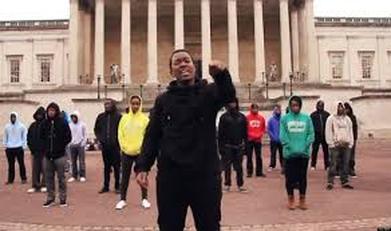"I Will Not Let an Exam result Decide My Fate" nor My Ability to Climb a Tree!
|
|
Albert Einstein, a famous scientist, Thomas Edison, the man accredited for creating the light bulb, and Bill Gates, the father of Microsoft, certainly define the word genius for us. It’s not a mystery as to why the emphasis on math and science has increased over the years; math and science have been interpreted as the fundamentals of innovation and efficiency in a world where everyone is success driven: a.k.a money. However, somewhere in the process of confining genius within math and science with people like Einstein and Gates, other geniuses who excel in the arts and music have been ignored or demeaned. Students unable to live by this standard have often been categorized as incompetent and dumb and feel neglected at a time when they need nurturing. Suli Breaks, the rhetor of “I Will Not Let an Exam Grade Decide My Fate,” debunks the myth that education is the catalyst to a successful future.
|
a technology THAT CHALLENGES OUR EDUCATION
In a world defined through technology, Suli's message can be heard and seen by everyone all around the world, particularly in countries like America where schooling has become mandatory and emphasized. He argues that much of our fate lies in the hands of grades that are too irrelevant to our dreams in a rigged education system: “We all have different abilities, thought processes, experiences, and genes. So why a class full of individuals tested by the same means?” Suli’s message raises awareness about our educational system; the grades that we get will not even guarantee us a good job in the future. He shows that we are all different: students have different talents and passions but yet we’re forced to learn the same thing and are judged based on only that.

There is creditability and trustworthiness in his words because he speaks out of experience. He himself has gone through the educational system: “I believed Ms. Jefferson when she took me into the office and said that my exams would be imperative to my success because we were always taught to follow what Ms. Jefferson led. . .” He uses his own experiences as a student to exemplify the contradictions within contemporary social demands. The pathos of the dramatic setup of students standing in the background with hoods over their heads further represents the importance of students' perspectives and experiences. In choosing this backdrop of this video, Suli evokes a sense of liberation and restriction at the same time. He shows that, as students, we are limited by education but we can be also liberated by our refusal to be defined by the educational system alone. Suli’s message works in the video because students, including himself, unify to deliver this message.
tHE VIDEO-poem'S APPEAL

Suli uses the example of the kid and his mother in the beginning of the video-poem to portray that even parents know the educational system is not a journey to success and not every subject is needed in everyone’s future. The mother knows that what the kid is saying is true and a lot of the audience knows the situation all too well also for we have been in that boy's shoes. This message, thus, goes out to all the students who are pursing an educational career. It encourages us not to give numbers and letters the power to determine our future and discourage our futures.
Because Suli is a man of color, there is a certain type of appeal to his address. It is not a secret that most racial minorities in the United States are black and Latin@. The fact that a man of color is addressing this issue offers a different message than a white male represents. Demographics play a big role in this video. If a white kid were to perform this rap, there would be a completely different vibe and interpretation as well as explanation to the message. The majority of the population who live in tough neighborhoods and are faced with financial burdens are non-whites. Suli, moreover, is a black British student. His message not only derives from his experience with the American/European education system, but also how immigrants across the "developed world" might not have equal opportunities despite the democratic claims of equality for all.
Suli makes the point of not accepting social standards by reminding us that people are told not to have abortions but yet look down on teenage parents. He examines these same kinds of contradictions to make the point that society will demand the norm to be followed, but at the end of the day, each individual must take the power to decide for themselves.
Because Suli is a man of color, there is a certain type of appeal to his address. It is not a secret that most racial minorities in the United States are black and Latin@. The fact that a man of color is addressing this issue offers a different message than a white male represents. Demographics play a big role in this video. If a white kid were to perform this rap, there would be a completely different vibe and interpretation as well as explanation to the message. The majority of the population who live in tough neighborhoods and are faced with financial burdens are non-whites. Suli, moreover, is a black British student. His message not only derives from his experience with the American/European education system, but also how immigrants across the "developed world" might not have equal opportunities despite the democratic claims of equality for all.
Suli makes the point of not accepting social standards by reminding us that people are told not to have abortions but yet look down on teenage parents. He examines these same kinds of contradictions to make the point that society will demand the norm to be followed, but at the end of the day, each individual must take the power to decide for themselves.
American Dreams

Amidst the high unemployment rates and dysfunctionality in our educational system, we feel that Suli is addressing an increasingly problematic social issue. Everybody is blindly pursuing their dreams with the thought that education is the gateway to the American dream; however, that is far from the reality. Many students are pursuing a higher level of education by plunging into student loans and debts only to graduate and be jobless. In the end of the video, Suli clarifies that his intentions are not to detest education but rather to make us discern for ourselves the kind of system that we are trapped in. Schools are supposed to educate and education is supposed to help people become what they want to be and accomplish the things we may think are impossible.
Is it just sheer coincidence that there were more geniuses in the arts and music before the twentieth century, or is it a fact that art and musical intelligence no longer fit within the criteria of what it is to be a genius now? Schools are supposed to nurture minds to become infinite. Ironically, the educational system limits students with its demands of mandatory subjects and identical rubrics for idiosyncratic minds. Meanwhile, some groups are even set up to fail by racist codes. By turning to the treatment of President Obama during his presidential campaign, we can see exactly how the education of certain groups, in this case African Americans, is depicted. Like with Suli Breaks's work, we see the rhetorical influence of a young black male, Marc Lamont Hill, in helping us understand the system we are in.
Is it just sheer coincidence that there were more geniuses in the arts and music before the twentieth century, or is it a fact that art and musical intelligence no longer fit within the criteria of what it is to be a genius now? Schools are supposed to nurture minds to become infinite. Ironically, the educational system limits students with its demands of mandatory subjects and identical rubrics for idiosyncratic minds. Meanwhile, some groups are even set up to fail by racist codes. By turning to the treatment of President Obama during his presidential campaign, we can see exactly how the education of certain groups, in this case African Americans, is depicted. Like with Suli Breaks's work, we see the rhetorical influence of a young black male, Marc Lamont Hill, in helping us understand the system we are in.
